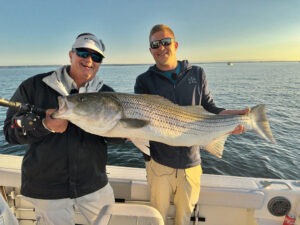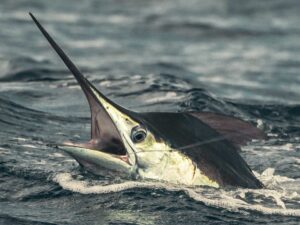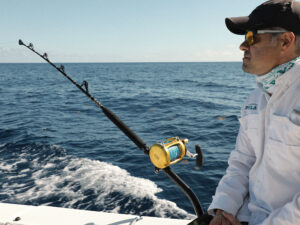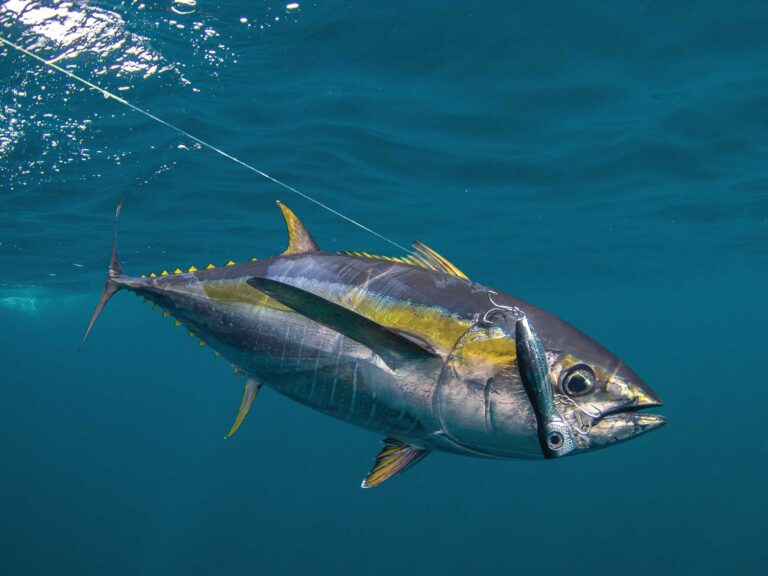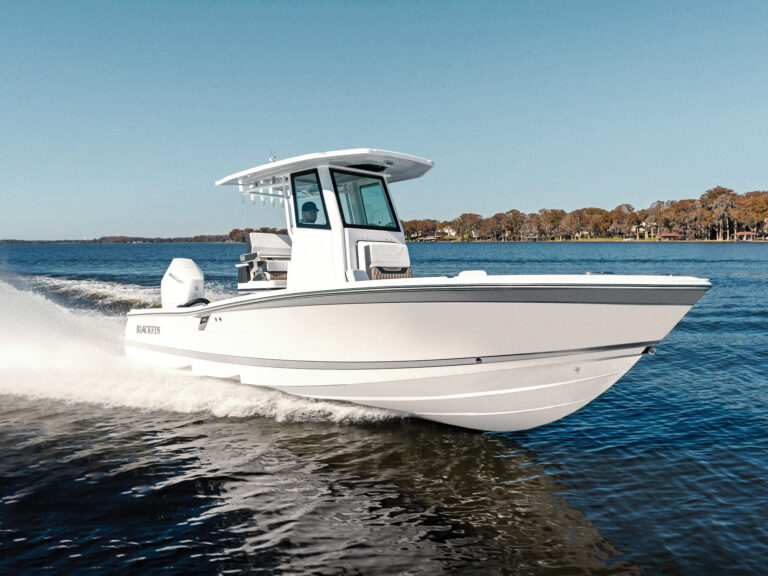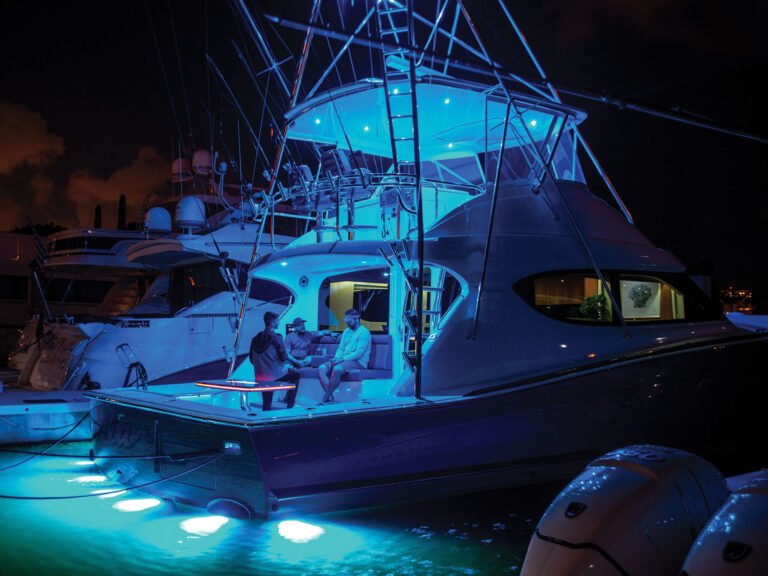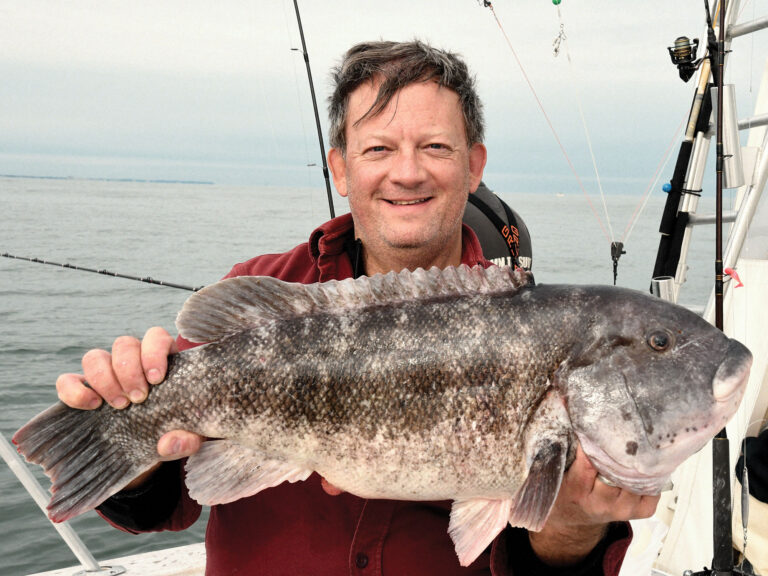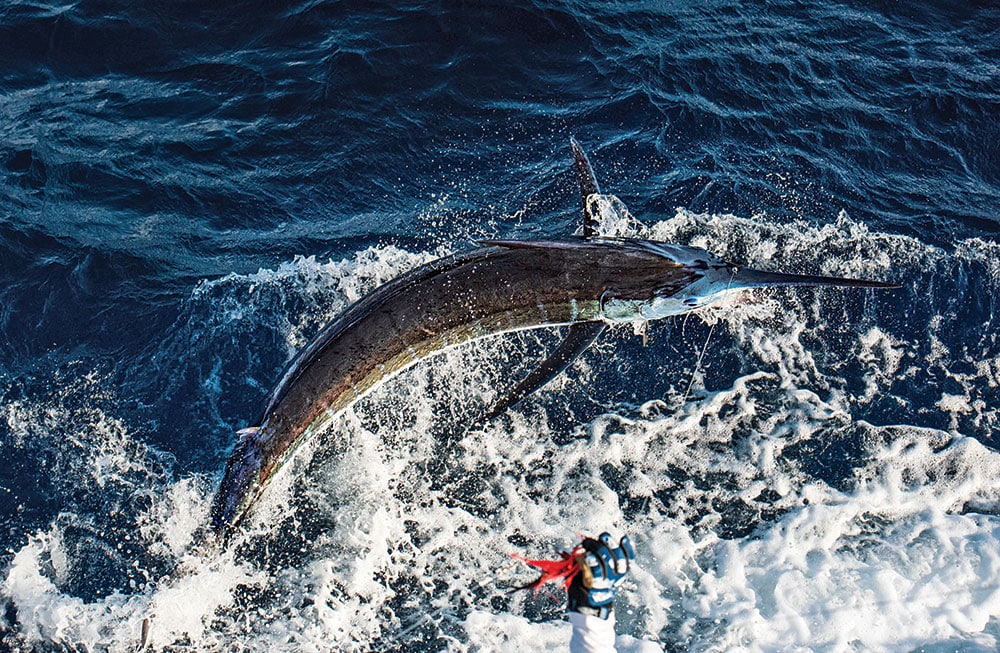
Hours passed as Capt. Rom Whitaker and I watched from the bridge of the Hatteras-based Release as five big baits smoked and splashed behind the boat. I was dozing off when mate Andy Trant broke the silence. “he’s on the shotgun!” I searched the water for a sign, but the fish was gone, so Whitaker turned the boat in a wide circle to cross the spot again.
On the second pass, the marlin came back with a vengeance. All I saw was a swipe and boil as the huge predator engulfed a skirted ballyhoo on the short rigger. With an 80-pound-class reel dumping line, the crew quickly cleared all the other lines while Whitaker put the single-engine boat in a hard turn to chase the fish. The next time the marlin showed itself, it was 200 yards away and heading toward the horizon. Then it leaped, seemingly in slow motion, as if to get a good look at us. My jaw dropped when the size of the blue finally registered. Even two football fields away, it looked massive.
As Whitaker closed the distance, the fish went deep. The angler worked the reel furiously until the marlin’s neon accents glowed below the boat. Trant grabbed the leader, and the big fish breached 15 feet off the stern, but the mate held tight and hand-lined the blue until he was able to reach for the skirt and cut the line at the hook. Still full of spunk and suddenly free, the marlin splashed its man-size tail and turned for the deep.
As the 9-foot beauty -slowly swam down into the purple-blue Gulf Stream, I remained quiet, still in awe of what had just transpired. I’d caught blue marlin before, but they were chance encounters while targeting other species. This was the first time I spent two days purposely targeting the biggest fish in the sea. Noticing I was just shaking my head, still at a loss for words, Whitaker laughed and admitted, “If I had my choice, I’d target blue marlin every day.”
Summertime Blues
Could you target blue marlin every day? “In the summer, absolutely,” Whitaker confirmed. “You could pull big baits and catch blue marlin all summer,” he added, encouraging my crush on these impressive apex predators. He said the fish first show up in May off Hatteras, where the action peaks in June.
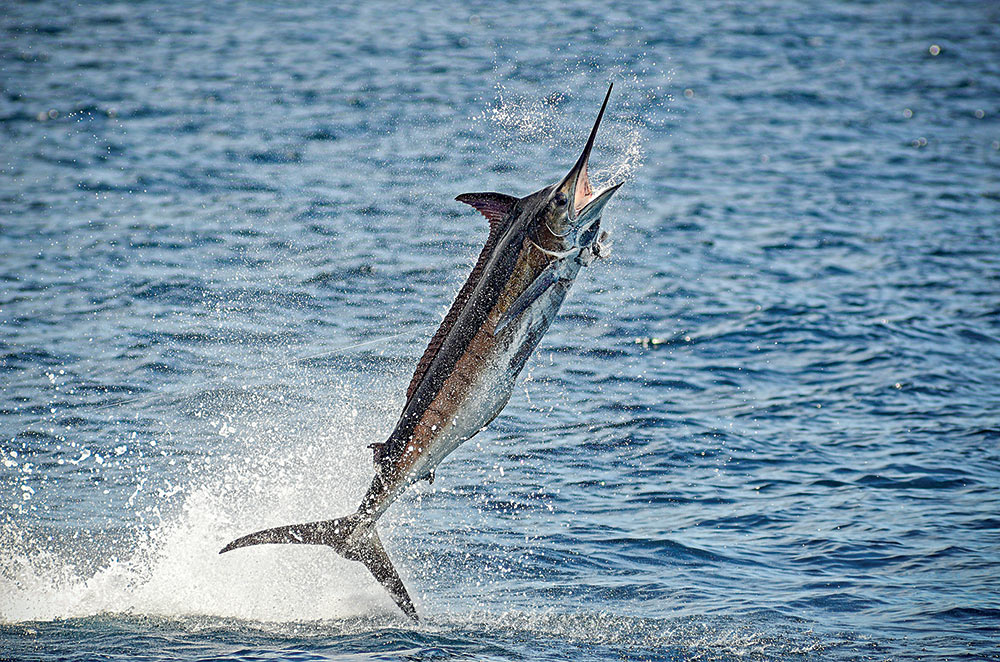
Then they move north, riding the Gulf Stream as far as New York. As the main body of blues travels northward, a few stragglers stay behind to keep anglers engaged. In late summer, blues return along the same path, following warm-water eddies swirling down the coast.
Marlin Mania
Could I trailer a midsize boat from one end of the fish’s range to the other, following the bite? I posed the question to Capt. Jimmy Hillsman, owner of Ocean’s East Bait and Tackle in Nags Head, North Carolina. “That would be a dream come true,” Hillsman replied, “and quite doable,” he said. “Just load on board a -quiver of 80-pound stand-up combos, spool the reels with hollow-core braid and a top shot of 130-pound mono, then add a 400-pound snap swivel, 30 feet of 500-pound leader, and a 10/0 hook.”
When I asked for his bait recommendations, Hillsman revisited his many years fishing off Oregon Inlet. “I’d have a Spanish mackerel somewhere in the spread,” he started, “naked or skirted. And I would add large, skirted horse ballyhoo to the other positions.” He explained that lure color depends on water conditions. “Red-and-black is one of my favorite combinations. It works best in pretty, hot, purple water.” For -greener water, however, Hillsman says he would rather go with pink or green.
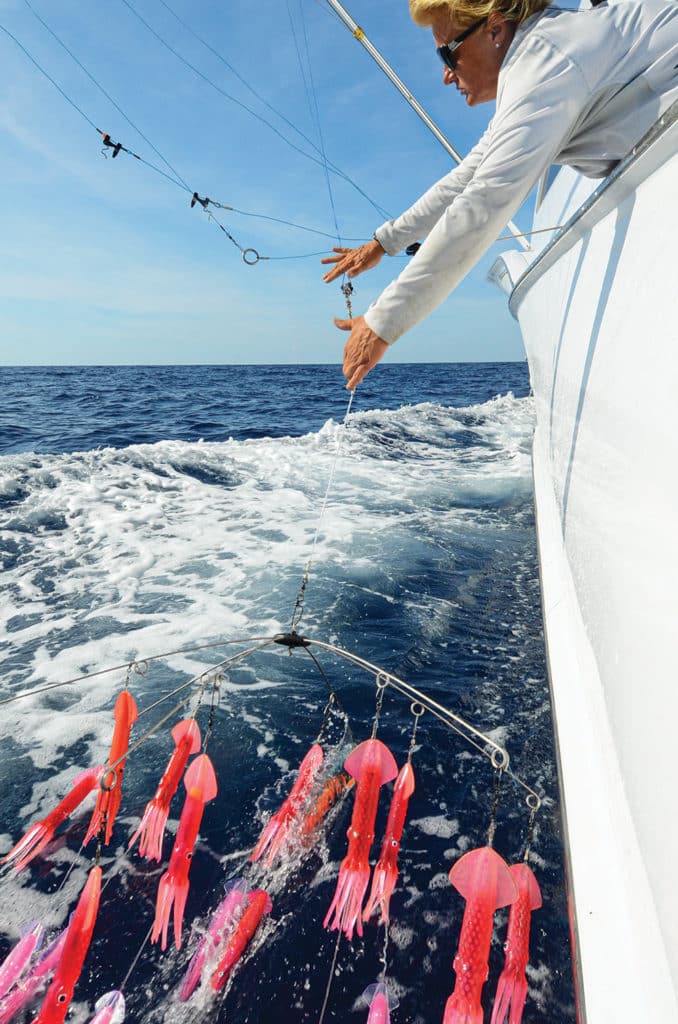
For teasers, Hillsman would run a huge lure such as a Black Bart Xtreme Breakfast or Grander Candy on one side of the spread. “I’ve caught more blue marlin off the Grander Candy than any other teaser,” he adds. On the other side, he would pull a chain of seven 12-inch squids, punctuated by an Iland Express rigged with a horse ballyhoo or Spanish mackerel.
To draw more fish to the boat, Hillsman recommends running two squid -dredges below and ahead of the squid chains. He would place the flat lines inside and just behind the teasers, then position the short riggers outside and behind the flat lines, in clear water. “You could get away with four rods,” Hillsman suggests, pointing out that a simple spread with the baits close is easier to manage when a big fish comes for breakfast. “I’d also carry two pitch baits that match the trailer on the squid chain,” he says.
After an hour pining for blue marlin, Hillsman wrapped up the ultimate small-boat outfit with a stand-up harness and heavy-duty gloves to wire the fish. “Maybe someday we’ll make it happen,” he hopes. I then closed my eyes and pictured us battling -giant blues all summer.
Dream Pursuit
Capt. Ryan Knapp is living the dream. His team, fishing aboard Top Dog, won the Hatteras Village Blue Marlin Tournament, then followed that victory with another at the Big Rock Blue Marlin Tournament with a 914-pound behemoth. Whenever his crew leaves the dock, they are going for blue marlin.
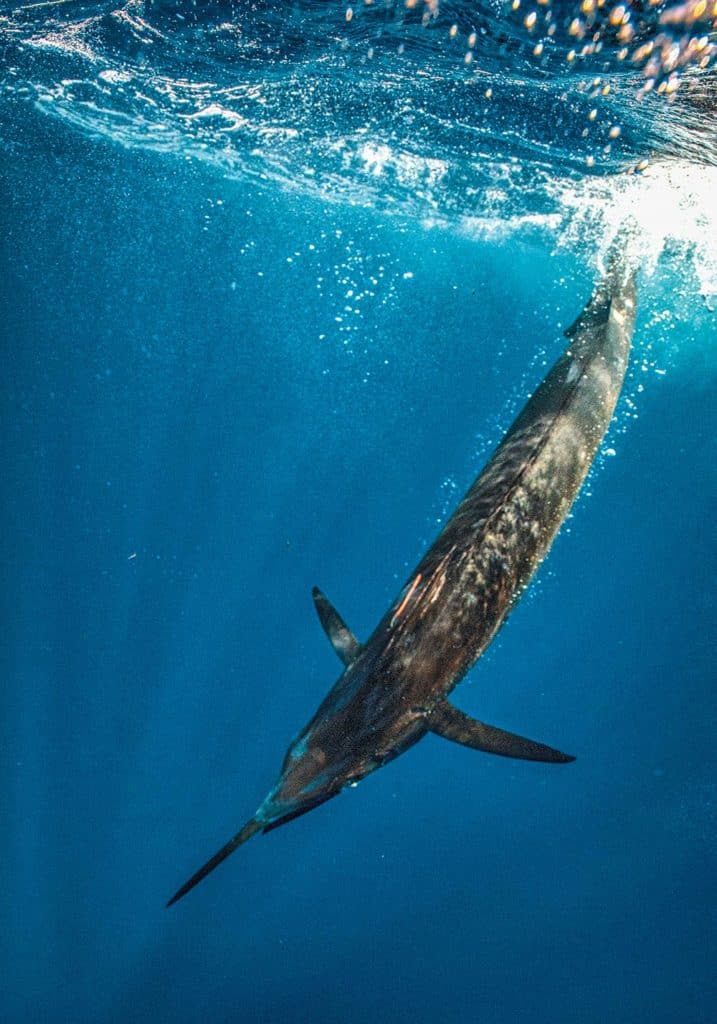
The North Carolina Governor’s Cup Billfishing Conservation Series is a schedule of eight tournaments with several events paying out for biggest fish weighed. The format encourages teams to target blue marlin, but the tournament rules require large lures with J hooks, or natural baits on circle hooks. Since anglers aren’t allowed to use J hooks with natural bait, that outlaws skirted ballyhoo, the most effective bait.
Artificial Vs. Natural
The mentioned restriction changes the blue marlin game. Knapp described it like this: “Lure fishing can be extremely frustrating.” First, lures don’t seem to draw as many bites as a natural bait. Second, it’s -harder to hook a fish with a lure. The hooks have to snag the fish as it attacks. With a natural bait, the fish is more likely to eat the hook. To cover more ground, skippers troll lures up to 10 knots, resulting in marlin visits that are fleeting and fateful. “Hookup ratio is 50 percent at best,” Knapp explains.
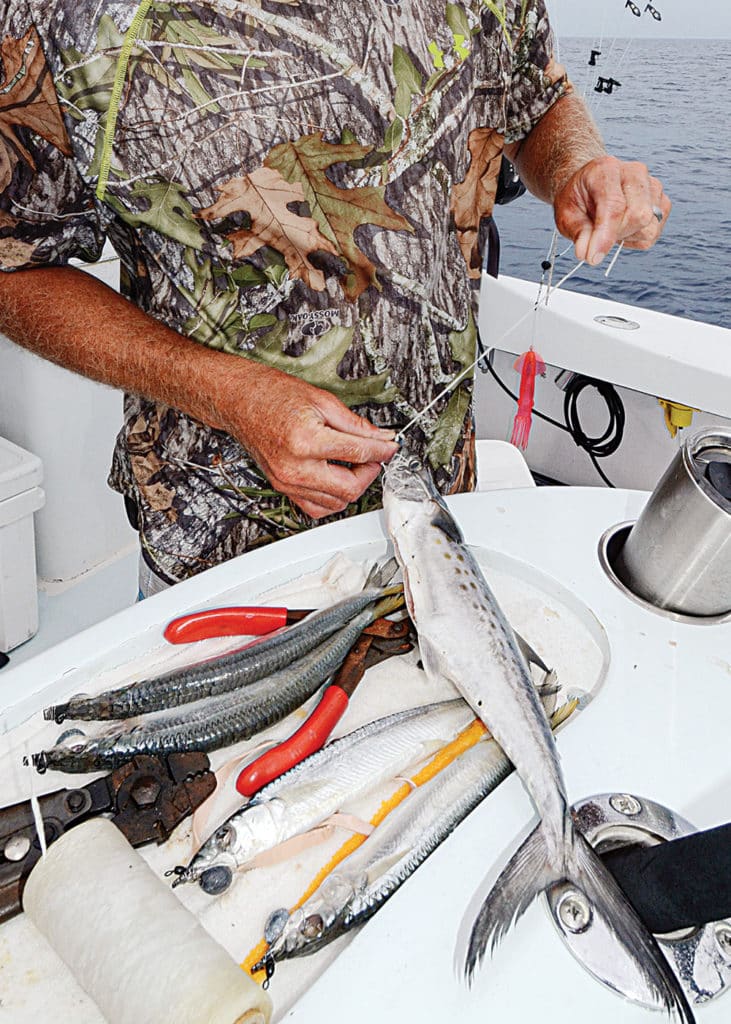
To up the odds, Knapp limits his spread to five lures. He uses a horse ballyhoo behind a circle hook for a pitch bait. “I like big lures on the flat lines,” he says. He chooses smaller swimming lures on the short riggers. “We don’t run long-rigger baits because the outriggers flex and don’t provide enough pressure to set the hook.” Down the center, he runs another smaller lure. “I want something I can crank up quickly in case a fish shows up on one of the -teasers,” he says.

To draw fish, he uses squid-chain teasers and dredges. He runs the dredge close to the boat, just under the first wave off the transom. The squid chains -follow on the next wave, and the flat lines go on the third wave. Short-rigger lures ride farther back, on the fourth wave, and the shotgun goes on the fifth wave.
Devil in the Details
“Lure fishing is exhausting,” Knapp says. Since lure placement is critical, his crew is constantly adjusting the position as sea conditions change. “I want the lure riding down the clear face of the wave,” he says, so he doesn’t use tag lines on his outrigger clips. Instead, he runs the line through a ring and R and R rigger clips. “The ring changes the pulling point and makes it easier to crank in the lure to remove grass,” he explains. To hook a marlin with a lure, the rigger-clip drag must be tight enough to provide pressure without getting stuck.
He prefers to rig his lures with a single hook-set, -using heavy cable and a swivel. He sets the strike drag at 18 pounds, then puts on the pressure to break the fish’s will. “We had 50 pounds of drag on the 914-pounder,” Knapp says.

Like the guy who always gets the girl, Knapp and his crew are lucky to fish for blue marlin all summer. Success doesn’t come easy. “We fished the Big Rock for five years and never got a bite,” he says. Knapp’s 2019 winner was the biggest blue marlin in Big Rock history. Fish over 1,000 pounds have been caught from North Carolina to New York. On his best year, Whitaker saw over 20 blue marlin, and other captains have scored up to 30 fish in a summer. Whitaker can’t help but dream: “If you targeted only blue marlin, you’d have a hell of a summer.”
What
Blue marlin
Where
Mid-Atlantic continental shelf and canyons
When
May through September
Who
These captains excel at catching blue marlin:
Ocean City, Maryland
Capt. Ryan Knapp
Top Dog
301-655-5695
Virginia Beach, Virginia
Capt. Randy Butler
Rebel
757-932-0036
Hatteras, North Carolina
Capt. Rom Whitaker
Release
252-986-1031
Rods
6-foot stand-up rated for 80-pound line
Reels
Penn 70 VSI lever-drag, two-speed or equivalent
Line
130-pound hollow-core braid, plus 300 yards of 130-pound Momoi Orange Crush
Leader
30 feet of 530-pound Momoi Extra Hard leader or equivalent, with 400-pound snap swivel
Lures
Black Bart Breakfast, Braziliano, Mold Craft Wide Ranger, single 9/0 to 10/0 Dozer hook-set
Bait
Horse ballyhoo rigged on an Iland Express, Sea Star or Ilander, with 10/0 Mustad 7691 or equivalent
Teasers
Squid chain with 12-inch Mold Craft or Squid Nation, Iland Express and horse ballyhoo, Black Bart Xtreme Breakfast or Grander Candy, dredge with 9-inch squid

